Amid a looming impeachment trial and with a month before Iowa caucuses, U.S. President Donald Trump has ordered an airstrike that killed Iran's top general in Iraq, ratcheting up tensions between Washington and Tehran.
The move triggered outrage among Democrats in Congress who complained that they were not informed in advance.
Senator Christopher S. Murphy, Democrat of Connecticut and a member of the Foreign Relations Committee, wrote on Twitter in the wake of the strike, "As report suggests, did America just assassinate without any congressional authorization, the second most powerful person in Iran, knowingly setting off a potential massive regional war?"
The strike is likely to have long-term implications on Trump's impeachment trial, and will change the contours of the 2020 presidential election.
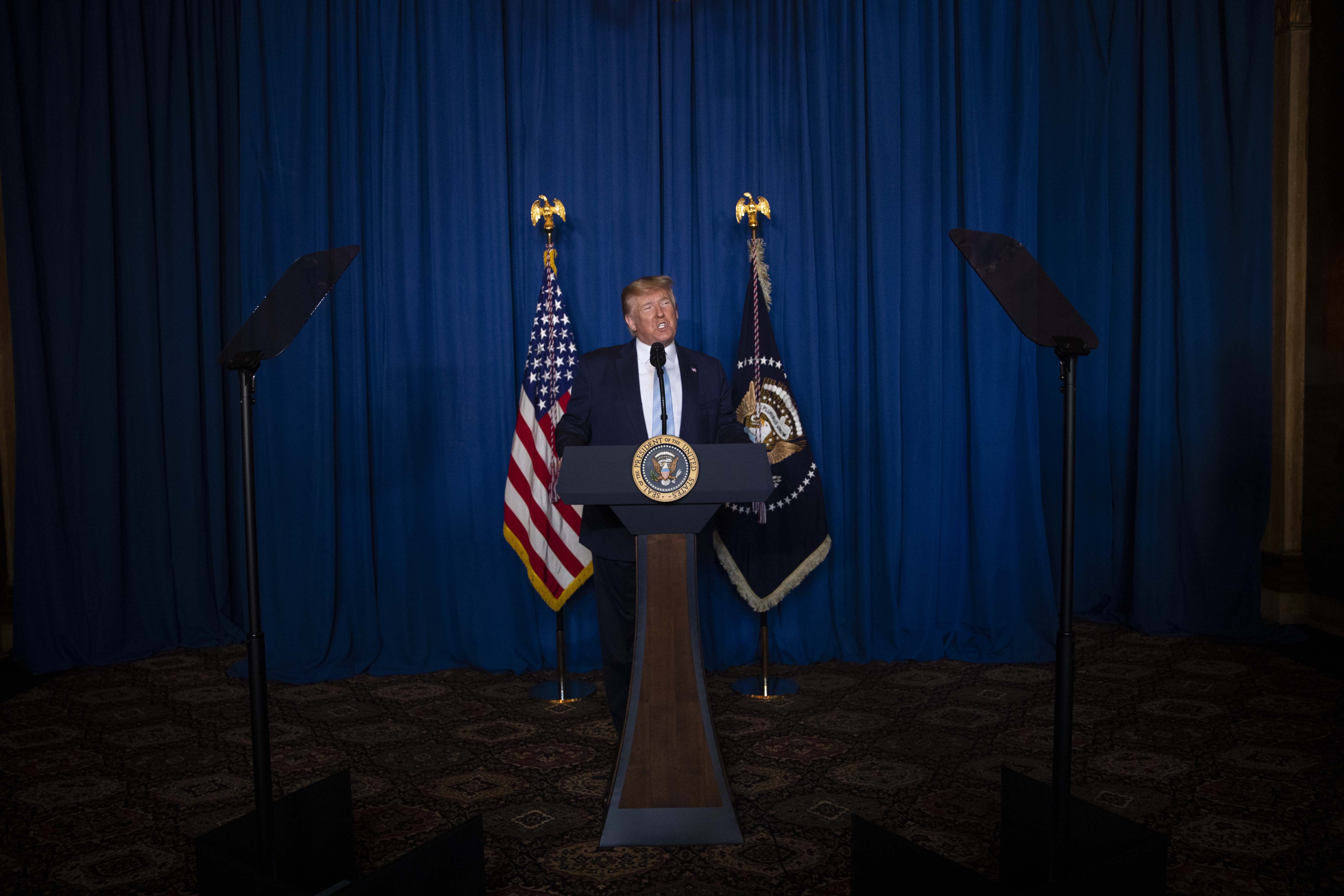
U.S. President Donald Trump remarks on Iran, at his Mar-a-Lago property, January 3, 2020. /AP Photo
U.S. President Donald Trump remarks on Iran, at his Mar-a-Lago property, January 3, 2020. /AP Photo
Contention over strike's constitutionality
Democratic congressional leaders, including House Speaker Nancy Pelosi and Senate Minority Leader Chuck Schumer, had been left in the dark. Meanwhile, Republican congressman, Senator Lindsey Graham, a close ally of Trump, said he was briefed on the issue in advance.
According to the 1973 War Powers Act, the president is required to report to Congress within 48 hours of introducing military troops to armed conflict abroad. Yet Trump argued that his tweet constituted a notification to the Congress.
Most Republicans have backed the strike. Republican Senator Jim Risch of Idaho, who chairs the Senate Foreign Relations Committee, even extended his congratulations to the president who he argued made a "decisive action" and achieved a "successful outcome."
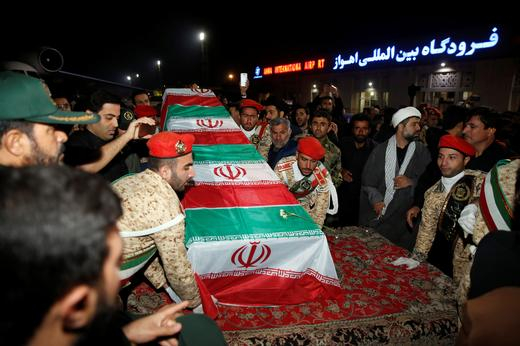
Iranian mourners gather around the coffin of the Iranian Major-General Qasem Soleimani at Ahvaz international airport, January 5, 2019. /Reuters Photo
Iranian mourners gather around the coffin of the Iranian Major-General Qasem Soleimani at Ahvaz international airport, January 5, 2019. /Reuters Photo
The strike reignited debate over the need to restore war-making power to Congress. Democrats argued that the president had no authority to order the attack without congressional approval. In a letter sent to the House Democrats, Pelosi said the House will introduce and vote on a War Power Resolution that would limit the president's military action within 30 days if no further congressional action is taken.
"Given that the vote on the War Powers Resolution is likely to come soon before the start of Trump's impeachment trial, the tension between Congress and Trump is going to escalate in the upcoming weeks," said Wang Jin, associate researcher at the China Institutes of Contemporary International Relations, in an interview with CGTN.
Congress is worried that since no experienced foreign policy hands can be seen around Trump – most have been pushed out of his administration – Trump may make reckless decisions that turn the hot conflict into a real war, she added.
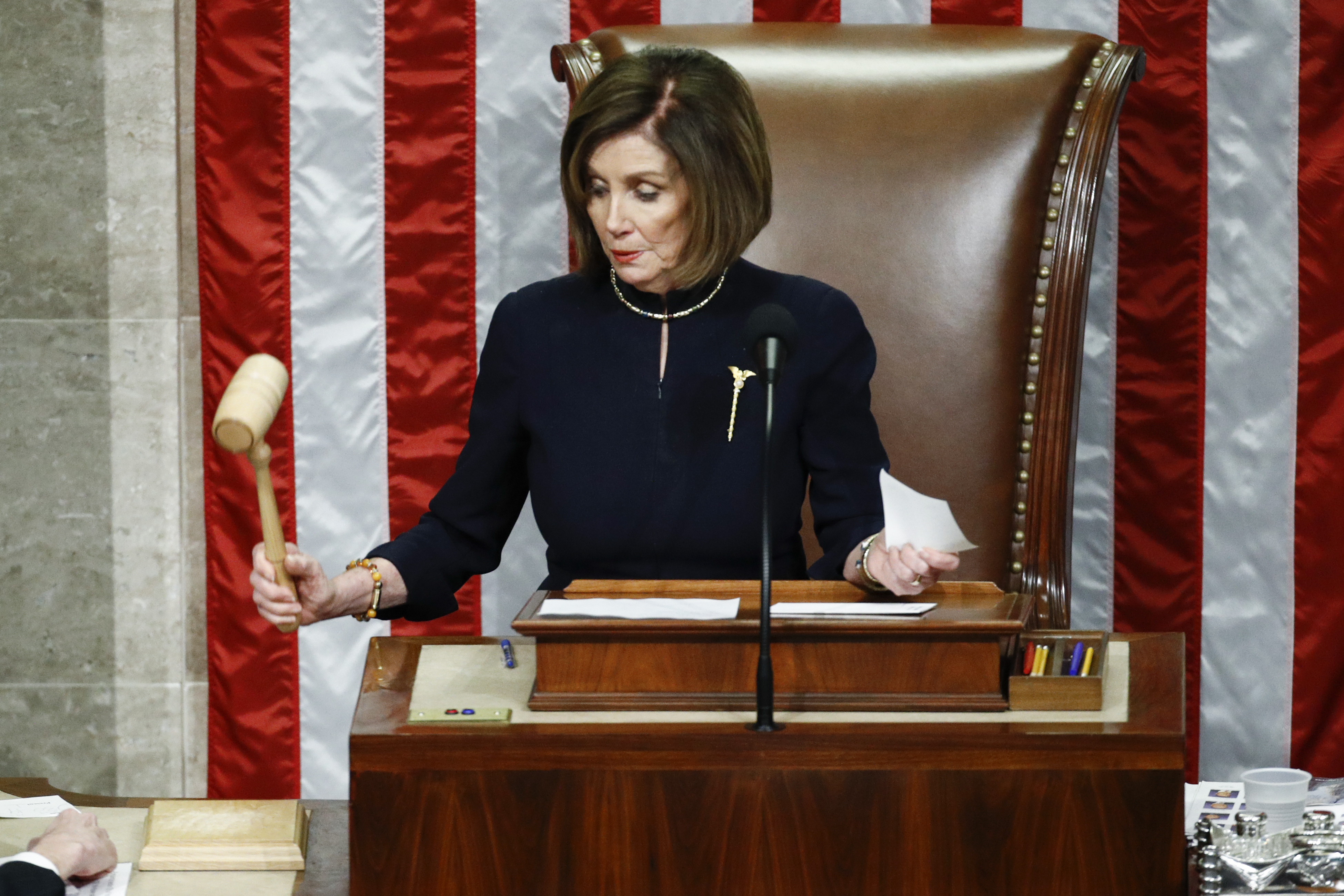
House Speaker Nancy Pelosi strikes the gavel after announcing the passage of article II of impeachment against President Trump, December 19, 2019. /AP Photo
House Speaker Nancy Pelosi strikes the gavel after announcing the passage of article II of impeachment against President Trump, December 19, 2019. /AP Photo
The overnight airstrike shifted domestic discourse in the U.S. from the impending impeachment inquiry to issues of national security.
Increased scrutiny over the national security issue may work to the advantage of the strongest contender Trump will face, Vice President Joe Biden, the most experienced foreign policy veteran on the Hill.
As former chairman of the Senate Foreign Relations Committee, Biden had an almost impeccable foreign policy resume. During the Obama administration, he led the lobbying efforts in the Hill to persuade congressmen to back the Iran deal to curb its nuclear ambition, a deal that the U.S. pulled out of under the Trump administration.
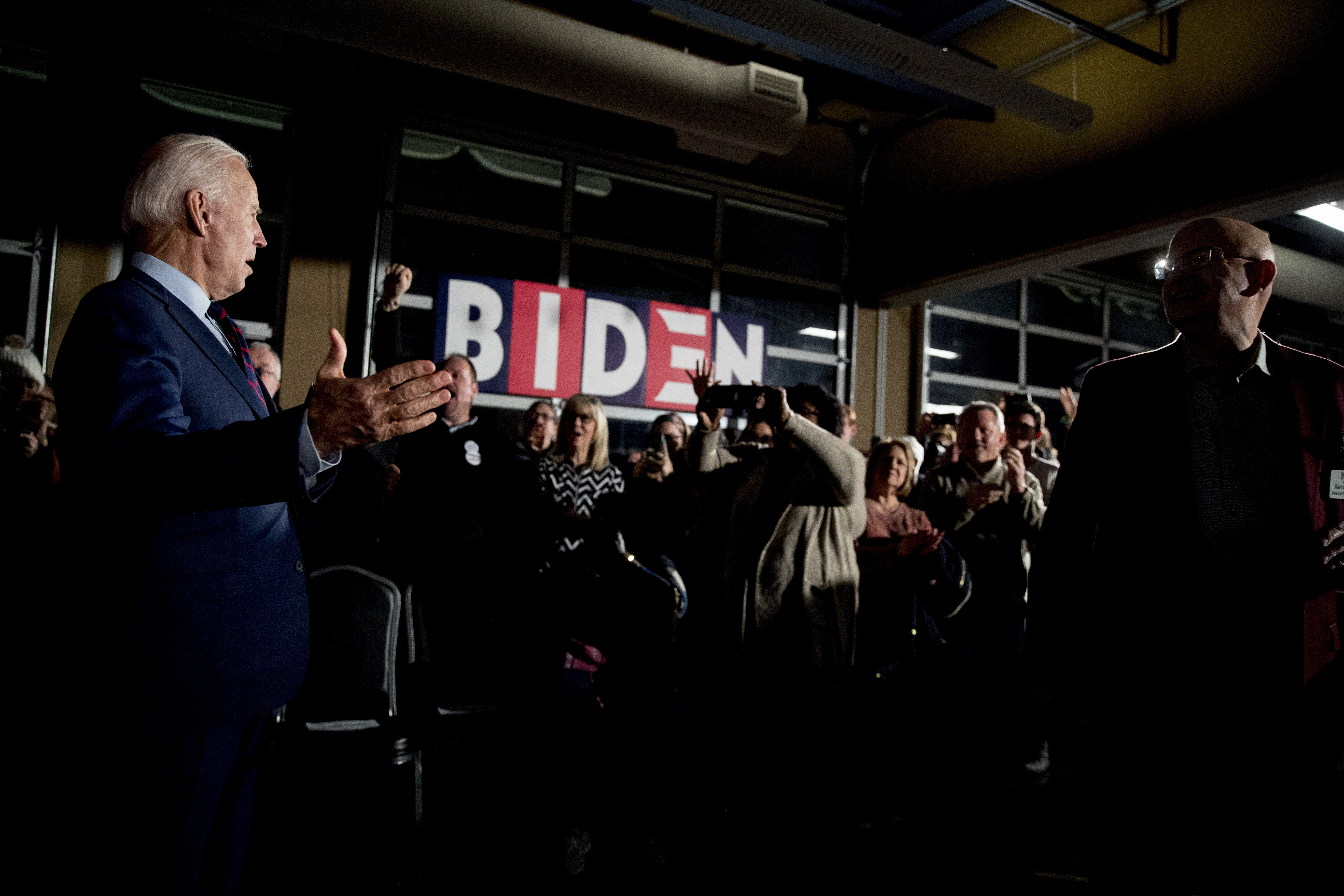
Democratic presidential candidate, former Vice President Joe Biden speaks at a campaign rally at Modern Woodmen Park, January 5, 2020. /AP Photo
Democratic presidential candidate, former Vice President Joe Biden speaks at a campaign rally at Modern Woodmen Park, January 5, 2020. /AP Photo
But there are also signs that Biden's "Iraq baggage" – him voting in support of going to invade Iraq back in 2002 – has invited extensive in-party criticism. "He supported the worst foreign policy decision made by the U.S. in my lifetime, which was the decision to invade Iraq," Democratic candidate Buttigieg said in an Iowa television interview.
Bernie Sanders, on the other hand, distinguished himself as the one who voted against all foreign policy pitfalls. One of his aids posted an image on Twitter after the strike was reported that Sanders spoke out against war in Iraq in 1991, 1998, 2002 and 2014.
The strike elevated the importance of the issue of national security in the presidential race, and other presidential candidates are likely to elaborate on how to safeguard national security in the presidential election, Wang told CGTN.
But still, the most salient issues in the race are going to be health care, immigration and economic growth, she noted. The effect of the strike would be limited when it comes to domestic issues that are close to voters' livelihood.
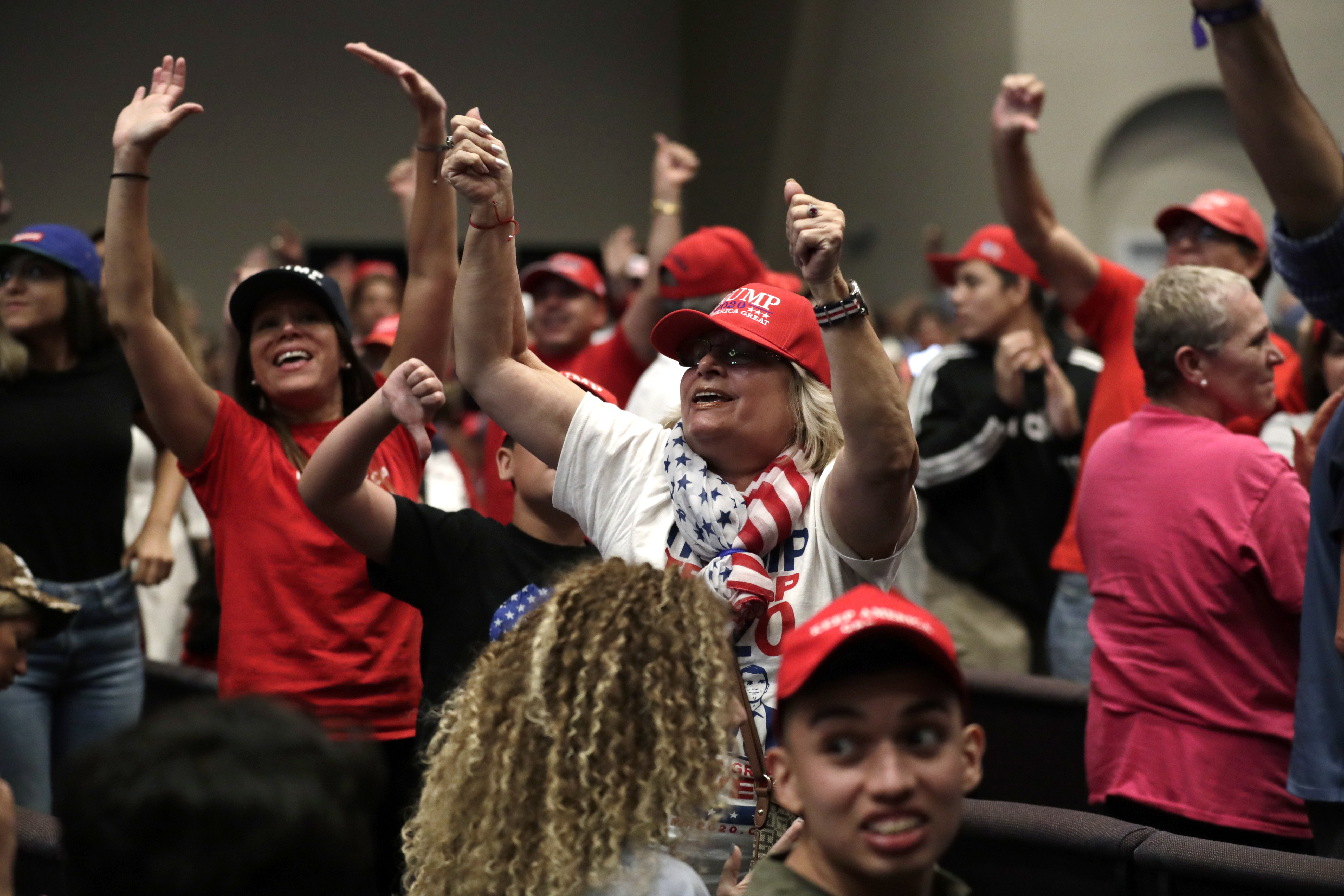
Supporters of President Trump turn and yell during a rally, January 3, 2020. /AP Photo
Supporters of President Trump turn and yell during a rally, January 3, 2020. /AP Photo
Another headache for the U.S.
Since the early days of his presidency, Trump has avoided moves to expand U.S. military actions overseas, seen by his decision to withdraw troops from Afghanistan and special forces from Syria.
Yet after Iran threatened to retaliate, Trump announced the deployment of thousands more troops to the region.
"Since the Obama administration, a bipartisan consensus emerged out of Washington that there should be no boots on the ground," said Wang. Rather than a ground force, Trump is more likely to order drone attacks and send troops to be deployed in Kuwait and Qatar to create deterrence against Iran.
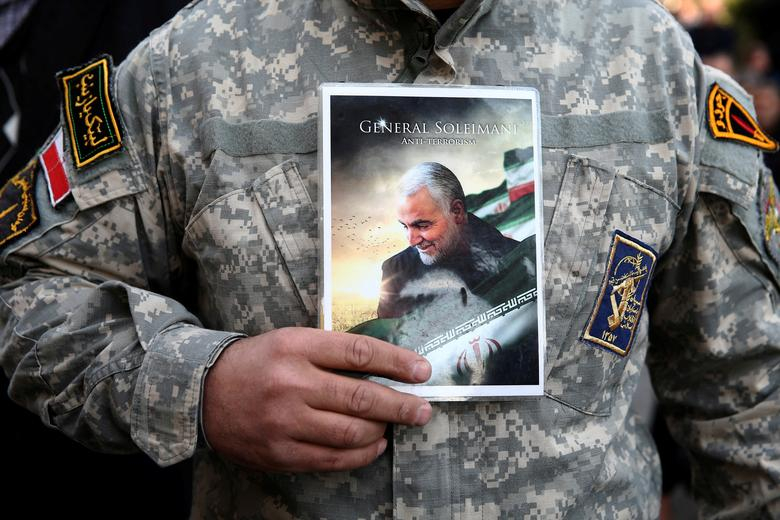
A demonstrator holds the picture of Qasem Soleimani during a protest in Tehran, January 3, 2020. /Reuters Photo
A demonstrator holds the picture of Qasem Soleimani during a protest in Tehran, January 3, 2020. /Reuters Photo
There is fear that either side may further ratchet up tension amid the escalating war of words. After the strike resulted in the killing of the top military general, Iran vowed retaliation against the U.S. and said it would no longer abide by the 2015 Iranian nuclear deal.
According to Wang, instead of launching a full-blown war, Iran is more likely to be engaged in a long-term strategic confrontation against the U.S., which will sap Washington's power in the region, with implications on the global oil market, the trade of crude oil, and nuclear non-proliferation.
"The U.S. may find itself further from the goal of a withdrawal from the Middle East after the airstrike," said Wang adding, "The impact is likely to last long and is going to be insidious."